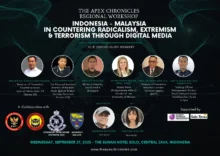Psychological Approach of Terrorism

Wartoyo (44) was in doubt when he met Amri Firmansyah, a figure at a religious recitation in a mosque in Jakarta. Wartoyo, who at that time had been in and out of prison three times for cases of abuse and drugs, easily believed Amri’s words quoting verses from the Quran (Ash – Shaff; 10-12), that jihad can erase sins.
Seduced by Amri’s words, Wartoyo did not refuse when Amri invited him to attend a recitation outside the mosque he used to attend and brought him together with Amri. Wartoyo attended exclusive recitations and eventually joined the terrorist group which became known as the Santhanam Kemayoran group, which is part of the Al-Qaeda-affiliated Jamaah Islamiyah.
What happened later, Wartoyo actually returned to prison for the fourth time with a colleague, Jumarto. He was arrested on June 10, 2011 in the Kemayoran Polsek area, Central Jakarta while carrying out his duty to poison food in the Police canteen with the fruit liquid he carried in a drinking water bottle. He was sentenced to 4 years in prison on April 17, 2012, two years less than the charge.
Being in prison was a turning point for him. He met two Bali bombers, namely Umar Patek and Ali Imron. Umar Patek, a figure who was once on the global terrorist list and is the most wanted fugitive by the United States, Australia and the Philippines, gave a message to Wartoyo.
“If later when you get out of here (jail) you are allowed to worship in the mosque, and no one forbids you to pray Friday, then it is forbidden for you to do mischief in this country,” Wartoyo said, imitating Umar Patek’s message to him.
Meanwhile, Ali Imron, a former Bali blast perpetrator told Wartoyo to be himself and stick with what he believed in. This message from Ali Imron was only understood by Wartoyo when he met with Aman Abdurrahman and was encouraged to pledge allegiance to ISIS but he refused.
“I don’t feel right, ISIS justifies all means,” said Wartoyo.
In addition, while serving his prison term, he saw that many police officers who had been the target of attacks by his group because they were believed to be taghut, turned out to be many Muslims and diligent in worship. They work to provide for their families. The doctrine he received, that jihad was synonymous with violence, war and murder, finally faded.
“Jihad does not always have to be a war by killing people, earning a living for the family, helping people who are in trouble, as well as jihad,” said Wartoyo.
According to him, when he was in prison he could clearly see that his wife was struggling alone to support her children and also take care of Wartoyo’s aging mother and that made him feel guilty. He realized that all this time he had not carried out his duties as a husband who provided for his family and also a child who was devoted to his mother.
Mentally Targeting
Researcher from the Political Psychology Laboratory, University of Indonesia, Dr. Joevarian Hudiyana, told The Apex Chronicles that a convict’s decision to leave his group is more influenced by the psychological side and not by his beliefs. This was based on the data he collected from interviews with 89 terrorism convicts who were still in prison at the time of his research.
“Religious understanding is actually not central, followers usually don’t think too much about religion, there is a tendency to have alternative meanings of life,” said Joe.
He explained that deradicalization is very complex and complicated because it does not necessarily say that the ideologies and beliefs they believe in are wrong. The approach through the psychological aspect that emphasizes the existence of other goals and meanings in life beyond belief as well as the existence of other responsibilities outside the terrorism network that he participates in can be expected to be more effective.
“This can also be sourced from religious teachings, for example if you previously believed that violence and war were the only way for jihad, then you could approach that jihad does not have to be violent, there are other ways,” explained Joe.
Joe said that this psychological approach is applied when someone is recruited to become a terrorist. He underlined that radicalism and extremism are not on-off or instantaneous, but there are processes and stages. At the highest stage, someone exposed to radicalism and extremism is willing to make sacrifices or commit suicide bombings.
Someone who can be recruited into a terrorist called Joe as a vulnerable group. They are people who have lost the meaning of life, lost their purpose in life, are empty, lonely, and people who feel their presence is not considered important, even by their own immediate environment, namely family or loss of significance.
“Religion is secondary, the first is the search for meaning as the trigger first,” he said.
People from groups with vulnerable psychological conditions, whether their religious understanding is high or low, will be affected when there are things that make them feel important. For example, when someone is losing the meaning of life then he is invited to do jihad even though in the wrong way but is then told that in that way he has fought for something in the name of God and that is something important.
This exposure explains why there are people who, even though they attend a recitation which are actually held by a terrorist group and some of them contain certain doctrines, are not affected at all. These people, according to Joe, are people who have an awareness of responsibilities and important things in their lives.
“These people, even if they met with the network earlier, but because their psychology was not affected, they would not be exposed even though they both attended lectures held by the terrorist network,” he said.
Responding to the story about Wartoyo meeting Amri at a public recitation, then being invited to attend another study outside the forum, as well as a more exclusive study, Joe confirmed that there are always stages. There is a preparatory stage to the final stage when a person has a very strong commitment to the group and its tasks.
Joe describes the stages that a person goes through before finally becoming a terrorist. It starts from the first stage when he is still in the general population and shows his vulnerability or is in a loss of significant condition due to personal problems in his life. At that time, he then met a certain narrative with nuances of injustice, that’s where he then entered the second stage.
In the second stage, he wants to get out of the loss of a significant situation or lose the meaning of himself that he faces. At this level he feels that if he joins a certain group and follows certain teachings he will feel meaningful again. And this is where the third stage begins, there is a mentor role at this stage who will lead and direct him to an association or group that he thinks can make him feel meaningful, recognized, and important.
Next is the stage of doctrination or delivery of teachings as well as norms that apply within the terrorist network group which makes him feel that the teachings are the most correct, that what he is doing is correct. At this stage there is also a moral justification and dehumanization which considers that even though their enemies are both human, they are considered inferior.
The fifth stage becomes the highest level, namely when a person surrenders completely to the teachings he believes in and is willing to sacrifice in this case realizing jihad even though it means sacrificing his own life, such as committing suicide bombings or staying alive but being arrested by the police.
Approach From Those Who Have Been Involved
Head of Sub-Directorate for Community Development, Directorate of the National Counter-Terrorism Agency (BNPT) Solihudin Nasution said that characterization is an important factor when deradicalizing a terrorism prisoner. He admitted that deradicalization involving ex-terror convicts was more effective because they had the same understanding and had been in the same situation.
The right approach is very important, especially in conveying calls to quit or leave the network. When figures who are well known in terrorism networks and have experienced the bitterness of being imprisoned for terrorism are involved in the deradicalization process, terrorism convicts who are undergoing deradicalization programs can be more acceptable to them. Both before and after being released from prison. They will be a real picture that there is still another life when you leave the terrorism network and stop being terrorists, and can also provide examples of how to re-mingle with society.
According to Nasution, indeed, among the terrorism convicts who have been released, there are those whose radicalism ideology has not disappeared and is still strong even though they have served their sentence in prison. So, if they meet or are in the wrong environment or are in an environment that used to make him a terrorist, then it is very likely that they will be involved again in terrorist activities and become recidivists.
“We partner with former moderate terrorists to provide enlightenment so that they do not return to being recidivists,” said Nasution.
Former terrorists have been approaching them ever since the terrorist convicts were in prison. They carry out counter-narratives by exchanging ideas with terrorist inmates using sentences that are acceptable to a terrorist inmate. Changes in mindset are not carried out directly, as did Umar Patek and Ali Imron. In addition, ex-convicts also approach the families and environment of the terrorist convicts concerned and provide understanding to them to be able to accept them back when the terrorist convicts are later released because if they feel accepted by their family and environment, discrimination will occur. The disengagement process will be easier to do.
The Institute for Policy Analysis of Conflict (IPAC) reported that of the 825 terrorism convicts who had been released, 94 of them were re-involved in acts of terrorism or around 11.3%. So far, BNPT has three programs related to the deradicalization of ex-terrorism convicts, namely concerning national insight and religious education that have been carried out while terrorism convicts are in prison and continued economic assistance to terrorism convicts who have been released.



